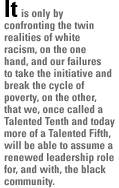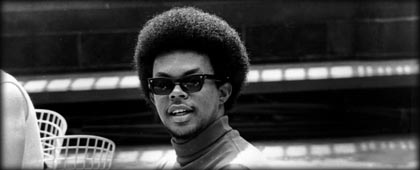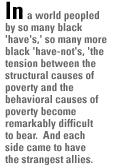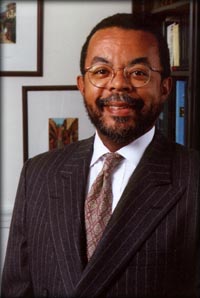 |  |
 |


When I first saw Sterling, I simply presumed it to be the University
cathedral, garbed as it was in new-Gothic splendor, its spirals pointing the
way to Heaven, high above the New Haven skyline. Its gargoyles and
stained-glass windows suggested Canterbury or the Vatican to me. When I first
encountered its row and rows of oak catalogue cards, I found myself wondering
what kind of church this might posibly be. A soft-spoken, walnut brown-skinned
woman smiled softly at me the first time that I returned some borrowed books.
"They are a bit overdue," she had told me, staring at me with dark brown eyes.
"But let's just ignore that little inconvenience." We got to know each other,
and once she casually mentioned that she didn't get to see her daughter-in-law
very much these days, since she was in prison. Huggins...Ericka
Huggins! You could have knocked me over with a feather! The John Huggins that
we had heard so very much about all through the 1969 academic year, the same
John Huggins murdered ostensibly over a squabble about the black studies
curriculum at UCLA between the Panthers and Karenga's US organization,
that John Huggins, fledgling Black Panther had been produced in a home
practically within the spiralling towers of Yale's Sterling Memorial library!
After that realization, I became deeply committed to defend Bobby Seale's right
to a fair trial, even if I couldn't quite wrap my fingers around the Panthers'
socialist platform or what seemed to me to be their militaristic discipline.
We went on strike on April 15 1970, two weeks before Nixon and Henry
Kissinger invaded Cambodia. The Panthers had come to New Haven in
spades late in the fall of 1969, hoping to dramatize their plight by forging
alliances with Yale's privileged white elite. "We must heighten the
contradictions," they would repeat to us, over and over. It took us awhile to
realize that "heightening the contradictions" meant that one of us--or, better
yet, one of our wealthy white classmates -- might "get busted," or busted over
the head, brutalized by the New Haven police during a political rally against
police brutality in front of TV cameras broadcasting live for the rest of the
country to see. Soon we realized--or de Chabert, our prince of a leader
realized -- that we had to become a vanguard, yes, but to protect our common
Mother, Yale -- the Library, the neo-Gothic twelve "colleges" or dormitories,
and above all else, our new friends -- from the Panther's most ardent desire to
see the police bust our heads.
We struck because Bobby Seale, we felt deeply, was not being tried fairly just
down the street, bound and gagged as he had been in Chicago and as we were sure
he would be in New Haven during the worst moments of the trial. And, through
some miracle of simpatico, noblesse oblige and grit, we persuaded a
healthy majority of our white classmates to "shut the joint down". Yale joined
the "Moratorium" that led to the most widespread strike in the history of
higher education in America. We knew that we were on the right path when
Kingman Brewster, Yale's dynamic aristocratic president, not only supported our
sentiments but openly declared that "I am skeptical of the ability of a Black
Panther to receive a fair trial in this country."
That was the end of any skepticism among the students. It was also the end of
Kingman Brewster's romantic honeymoon with the Yale alumni, already bent out of
shape by co-education and the emerging presence of so many wooly heads amongst
Yale's much vaunted 1,000 Male Leaders. Kingman's days had become suddenly
numbered.
The strike rally was glorious: it seemed as if 100,000 people crowded onto the
New Haven Green on May Day of 1970, although the New York Times reported only
15,000. Kingman offered them food and shelter in the residential colleges.
It was an organized protest, led by the likes of Abbie Hoffman and Jerry Rubin,
Ken Mills, and our own Glenn De Chabert. Each stained glass window of that
sacred cathedral of learning that we called "Sterling" stood intact at the
week's end. De Chabert had never spoken more impressively, had never been more
daring or inspiring,
As for me, it was time to make a change, time for me to make a pilgrimage to
"the great pork-chop," as Eldridge Cleaver called "Mother Africa," to see for
myself what all this blackness stuff was all about, really. And to
check out a beast called "African socialism" close-up, in the Tanzania of that
philosopher-king, Julius Nyeyere. There, I worked in an Anglican mission
hospital for much of a year, before returning to "Babylon," as the Panthers had
so poetically christened America, true Babylonian that I soon realized that I
was. Yes, it was time to make a change.
That year-long sojourn to the Continent killed any residue of desire I had to
be a doctor; I returned to Yale, majored in History, graduated with a slew of
honors, and won a Mellon fellowship (A "watermelon fellowship," my Dad had
declared, because I was the very first black to receive it) to go off to
Cambridge, where I finally admitted to myself that, all along, I had wanted to
be a scholar and a writer and had wanted to do so for many years.
When I returned a few years later to teach at Yale, so very much had changed:
any pretense that black admissions would be anything but staunchly and firmly
middle-class had long ended during my absence abroad. The new black middle
class was perpetuating itself. The openness of Affirmative Action, under
assault by Bakke and wounded, was functional enough to increase the
size of the middle-class exponentially.
And yet... and yet... the gradual disappearance of industrialjobs in
the cities cut off that upwardly mobile class escalator that so many in the
middle class had been able to ride, from no jobs to menial ones, from
non-skilled labor to the craft unions. It had been the security of union wages
that engendered educational aspirations, and its concomitant, personal
responsibility. Within what seemed to be the blinking of an eye, the
"intolerable" ghetto conditions against which we had railed so ardently in the
late sixties would take on (through the sepia lens of nostalgia and our own
ample frustrations at the seeming futility of so much for which we had
sacrificed) the wistful splendor of a better day that we had fled, when once
upon a time when we were colored.
In a world peopled by so many black have's, so many more black have-not's, the
tension between the structural causes of poverty and the behavioral causes of
poverty become remarkably difficult to bear. And each side came to have the
strangest allies: Farrakhan's economic program reads like the last Republican
Party Platform; the Million Man March seems like the greatest self-help rally
of all. Missing from the Million Man March was that bastion of Booker T.
Washington boot-strap boosterism, Mr. Justice Clarence Thomas, who could not
possibly be displeased by its call for more and more personal
responsibility.
So the blackest thing that a man could do that October was to go to
the Million Man March. "Were you there?" I've been often asked, knowing immediately where
"there" was. "Did you see it, Brother? Did you feel it?" And it was a
sublime event, despite Farrakhan's rambling two-hour address and his own
failure to atone for his own sexism, anti-semitism, and homophobia. Many of my
friends attended and were deeply moved by what they saw. Relieved once again
to have been able to bridge the black gap of class, to have been down with the
brothers. Still, I wonder--if Bill Clinton, Ross Perot, or anyone else had
turned up at the Million Man March on Washington and handed over a check for
$500 billion--would anyone there have known how to spend it to solve the
problems of the inner city? I certainly have no magic cures.
For so many of us, the gap of class has made us hunger for the sepia caste
warmth of the fifties and sixties, the good ole days of segregation. Many of us
try to assuage our own guilt, to relieve our own angst and deeply-felt
anxieties, through a symbolic black cultural nationalism: John Coltrane poster
framed and hanging in a living room. A numbered Romare Bearden print in the
den. An African sculpture neatly displayed and lighted here and there. Boxed
sets of Monk and Coltrane, Charlie Parker and Miles, strewn around a coffee
table. Kente cloth bow ties and cummerbunds peeping discreetly from under our
tuxedos. We're still down with the program.
If black nationalism is the figure in the carpet of African American culture,
then class differentials comprise the sordid stain that the carpet covers. For
my community, the African American community, it is the best of times and the
worst of times. We have the largest black middle class in our history, and the
largest black underclass. According to a report by the Alternative Schools
Network, in 1990, nationwide, 2,280,000 black boys and men were jailed or
imprisoned at some time during the year, while only 23,000 earned a college
degree. That's a ratio of 99 to 1. For white boys and men, the ratio of
inmates to graduates was six to one, with 2,412,000 locked up at some time in
1990 and 413,000 earning a bachelor's degree.
What do we do about this? What do we not do?
|  |

|  |  |
First of all, we have to stop feeling guilty about our success. Too
many of us have what psychologists call "the guilt of the survivor," deep
anxieties about leaving the rest of our fellow blacks in the inner city of
despair. We need to feel the commitment to service, not to guilt. Our
community, our families, prepared us to be successful. "Get all the education
that you can," they told us over and over-- and we did. When I left home for
Yale. virtually my whole hometown celebrated that fact. "The community," as we
so romantically still put it, wished for us to succeed. "Talking black,"
"walking black," wearing kente cloth, listening to black music, and filling our
walls with black art--as desirable as these thing can be in and of
ourselves--are not essential to "being black" if our individual sensibilities
are not attuned to these things. I tell my students that you can love Mozart,
Picasso and Ice Hockey and still be as black culturally as the ace of spades.
Second, we don't have to fail in order to be black, as odd and as crazy
as this sounds. Far too many young black kids say that succeeding is "white."
Had any of us said this sort of thing when we were growing up, our families and
friends would have checked us into a mental institution. We need more
success individually and collectively not less.
Third, we don't have to pretend any longer that 35 million people can
ever possibly be members of the same economic class. Think about this! What a
bizarre idea. We are a nation: the entire population of Canada is 27
million, and we have 35 million blacks. Canadians are not all members of one
economic class. Nor do they speak with one single voice, united behind one
single leader. As each black person knows, we have never been members of
one social or economic class, and never will be. The best we can strive for is
that the class differentials within the black community cease their lopsided
ratios because of the pernicious nature of racial inequality. Even if racism
disappears, we will still face class differentials in the black community; we
have had these since slavery. Our job is to demand the end of sexism and
racism so that this kind of normal differentiation can occur without
systematic structural (racial) discrimination.
In a world in which the rhetoric of civil rights era sounds hollow and empty,
race differences and class differentials have been ground together in a
crucible of misery and squalor. And such a way that few of us can tell where
one stops and the other begins.
But I do know that the causes of poverty within the black community are both
structural and behavioral--as scholars as diverse as philosopher
Cornel West and sociologist William Julius Wilson have pointed out--and we are
foolish to deny this. A household comprised of a 16-year-old mother, a
32-year-old grandmother and a 48-year-old great grandmother cannot possibly be
a site for hope and optimism. Our task, it seems to me, is to lobby for those
social programs that have been demonstrated to make a difference for those
sufficiently motivated to seize these expanded opportunities.
More importantly, however, we have to demand a structural change in this
country, the equivalent of a Marshall Plan for the cities. We have to take
people off welfare, train them for occupations relevant to a 21st century,
highly technological economy, and put them to work. Joblessness, as Wilson
maintains, is our biggest crisis.
And while I favor such incentives as tax breaks to generate new investment in
inner cities, youth apprenticeships with corporations, expanded tax credits for
earned income and tenant ownership of inner city property, I believe
that we will have to face the reality that most of our inner cities are simply
not going to become overnight oases of economic prosperity and corporate
investment. And we should most probably think about moving black inner
city workers to the jobs rather than hold our breath waiting for new
factories to resettle in the inner city.
It is only by confronting the twin realities of white racism, on the one hand,
and our failures to take the initiative and break the cycle of poverty, on the
other, that we, once called a Talented Tenth and today more of a Talented
Fifth, will be able to assume a renewed leadership role for, and with, the
black community. To continue to repeat the same old stale formulas--to blame
"the man" for oppressing us all in exactly the same ways; to scapegoat Koreans,
Jews, or even Haitians for the failure of black Americans to seize local
entrepreneurial opportunities--is to fail to accept our role as leaders
of our own community. Not to demand that each member of the black community
accept individual responsibility for her or his behavior -- whether that
behavior assumes the form of black-on-black homicide, gang members violating
the sanctity of the church, unprotected sexual activity, gangster rap Iyrics,
misogyny and homophobia, whatever--is for us to function merely as ethnic
cheerleaders selling woof tickets from campus or suburbs, rather than saying
the difficult things that may be unpopular with our fellows.
 Being a leader does not necessarily mean being loved; loving one's community
means daring to risk estrangement and alienation from that community, in the
short run, in order to break a cycle of poverty, despair, and hopelessness that
we are in, over the long run. For what is at stake is nothing less than the
survival of our country and the African American people themselves.
Being a leader does not necessarily mean being loved; loving one's community
means daring to risk estrangement and alienation from that community, in the
short run, in order to break a cycle of poverty, despair, and hopelessness that
we are in, over the long run. For what is at stake is nothing less than the
survival of our country and the African American people themselves.
Just as we must continue to fight for more people of color to be admitted to
the student bodies and hired on the faculty and staff of our colleges and
universities, we must fight to see that Congress and the President enact a
comprehensive jobs bill and the equivalent of a Marshall Plan for the cities,
as the Urban League advocates each year. And finally, to help to bridge the
painful gap between those of us on campus and those of us left behind on the
streets, I call upon the Historically Black Colleges and Universities and
Afro-American Studies Departments in this country to institutionalize sophomore
and junior year summer internships for community development--through
organizations such as the Children's Defense Fund--so that we can begin to
combat teenage pregnancies, black-on-black crime, the spread of AIDS from drug
abuse and unprotected sexual relations and the counter spread of despair and
hopelessness that so affects our communities. Working together in programs such
as these, we can begin to bridge that gap that has divided the black community
into two.
Dr. King did not die so that half of us would make it, half of us perish,
forever tarnishing two centuries of agitation for our equal rights. We must
accept our historical responsibility and live Dr. King's credo that none of us
is free until all of us are free. And that all of us are brothers and sisters,
as Dr. King said so long ago--white and black, Protestant and Catholic, Gentile
and Jew and Muslim, Gay and straight, rich and poor -- even if we are not
brothers-in-law."
|  |